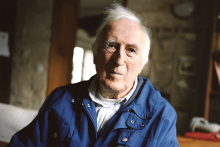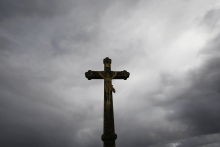Sexual Abuse

THE WORD “SELFISH” is used many times throughout writer-director Laurel Parmet’s coming-of-age film The Starling Girl. Seventeen-year-old Jem Starling (Eliza Scanlen) hears it most often from her parents. Her father (Jimmi Simpson) uses the word to describe the period of his life before he got saved and gave up drinking. Her mother (Wrenn Schmidt) chides Jem for selfishness when she isn’t performing her duties at home. And at church, congregants direct the insult at Jem whenever her performance in the worship dance troupe pulls attention toward herself and away from God.
This understanding of “selfishness” dismisses the community members’ unmet needs. Jem, like most teenagers, is starting to consider what kind of person she’ll become. However, the only guidance she’s getting is from her fundamentalist church, which advises her to give up her dreams, fear her changing body, and let her church decide who she’ll marry. It’s no wonder that Jem’s thoughts turn increasingly to the only person who gives her positive, albeit problematic, attention: the youth leader, Owen Taylor (Lewis Pullman), the married son of her church’s pastor.
The Starling Girl is an empathetic portrait of the vulnerability and power of young women. It shows what can happen when the structures around them — family, church, patriarchy — limit that power and stifle their desires and dreams. This leads Jem to a sexual relationship with the similarly frustrated Owen, who’s drawn to Jem’s seemingly boundless potential.

How the “welfare state” is designed to subsidize affluence rather than fight poverty.

Sexual abusers are disgusting “enemies” who deserve to be condemned and punished — but also deserve Christian love and pastoral care because they too are children of God, Pope Francis said.

“GRIEF TAKES SO much energy. I can feel it even in my fingers.”
These are the words that drew me to Christian author and speaker Beth Moore’s memoir, All My Knotted-Up Life. She posted the sentences as two separate tweets in the wake of her brother’s unexpected death, less than three weeks before her memoir’s release.
Through her Living Proof Ministries, Moore is one of the most prominent white evangelical women in the U.S. I braced myself as I entered the book, but she delivers stories of resilience with all the charm, sweetness, and humor one would expect from a memoirist with roots in Arkadelphia, Arkansas.

BEFORE HE STEPS onstage as Ike Turner in TINA: The Tina Turner Musical, Garrett Turner (no relation) does a simple ritual: He swirls a wooden mallet along the rim of a Tibetan singing bowl. As the sound washes over him, he focuses on himself as Garrett, not Ike the musician and abusive ex-husband of the “Queen of Rock ’n’ Roll.” And he prays.
“Tina found Buddhism on her way to liberation from Ike, and it was something that Ike decried,” Garrett told me a few days after I saw him perform in Atlanta. Embracing something that Ike pushed away helps Garrett become Ike onstage while remaining Garrett within. With eight shows a week for the touring Broadway production, this spiritual practice helps Garrett draw a clear line between himself and the broken man he portrays.

A report released today concluded that Jean Vanier — a Catholic lay leader and founder of L’Arche, a worldwide network of communities supporting adults with intellectual disabilities — founded the first L’Arche community primarily as a cover for a secretive religious sect with exploitative “mystical-sexual” beliefs and practices. The report also found Vanier sexually exploited at least 25 nondisabled women from 1952 until just before his death in 2019, far more than previously known.

THIS IS ONE way to tell the founding story of L’Arche:
The main character is a sailor-turned-ethicist named Jean Vanier. The son of the governor general of Canada, he was, as his biographer Anne-Sophie Constant wrote, “a child of privilege, he had danced with princesses, dined with politicians and philosophers, and circled the world twice.”
As the story goes, Vanier gave all that up in 1964 when his spiritual mentor, Thomas Philippe, a Dominican priest, took him on a tour of the psychiatric facility where Philippe was a chaplain. There, Vanier discovered, as he put it, “an immense world of pain.” This is not an exaggeration: At the time, asylums, which were notorious for overcrowding and abuse, functioned more as prisons than treatment centers. Inside these walls, Vanier heard an invitation — from Jesus and the men with intellectual disabilities — to do something.
So Vanier bought a broken-down house in Trosly, France, and invited two men from the mental institution to live with him. He named the home “L’Arche,” French for “The Ark,” a biblical symbol of protection in a storm-tossed world. Vanier traveled around the globe to tell the story of their life together, and soon L’Arche communities sprouted up in Canada, India, Australia, Haiti, and beyond — a constellation of communities where adults with and without intellectual disabilities have aspired to live, work, pray, and play together as equals. L’Arche became integral to the movement for the deinstitutionalization of people with intellectual disabilities, and Vanier became a best-selling Christian writer and hero to all of us looking to practice a faith that prioritized those on the margins.
When he was introduced to give lectures, Vanier often said, “I feel uncomfortable when people say nice things about me.” Yet the world had lots of nice things to say, bestowing upon Vanier countless awards, including the French Legion of Honor, the Companion of the Order of Canada, and the Templeton Prize. But for me, a certain 2010 accolade feels the most poignant: Astrophysicist C.J. Krieger discovered an asteroid and named it after Vanier. Vanier is above us; Vanier spins on a different celestial plane than the rest of us.
Before he died, Vanier was often called a living saint. Upon his death in 2019, Pope Francis sent his sympathies, asking Jesus to welcome Vanier into heaven as his faithful servant. It’s the type of eulogizing that you expect for someone who saw beauty and divinity where others saw shame and destitution.
It’s an inspiring story that changed thousands of lives: At the time of Vanier’s death, there were 147 L’Arche communities in 37 countries, home to approximately 10,000 people with intellectual disabilities. The protagonist of the story also saved my faith, showing me how Christianity is capable of destabilizing dangerous institutions, rocking the boat, building new arks.
Unfortunately, it’s a bad story.

Pope Emeritus Benedict XVI on Tuesday asked victims of sexual abuse in the Catholic Church for forgiveness but rejected allegations that he was involved in any cover-up. The retired pontiff was responding to an independent report, released on January 20, which chronicles decades of alleged abuse and misconduct in the archdiocese of Munich, which he led as Cardinal Joseph Ratzinger from 1977 and 1982.

As part of the Catonsville Nine, the rebel priest Daniel Berrigan joined eight other Catholic activists in setting fire to hundreds of draft files with homemade napalm. It was 1968 and he was protesting the Vietnam War. The way he evaded prison was perhaps as memorable as the crime he committed.

France’s Catholic Church said on Monday it would sell its real estate and, if needed, take out loans to set up a fund to compensate thousands of people sexually abused by clergy.
A major investigation found in October that French clerics sexually abused more than 200,000 children over the past 70 years.

WE ARE LIVING in dark times. A perfectly timed and distinctive new devotional, Darkness is as Light, wrestles with the dark, and from its many entries emerges a clear chronicle of the real power and meaning of God’s grace for us even—especially—in the dark.
The book consists of nine sections of eight entries each, beginning with a poem by Tennessee poet Allison Boyd Justus. Meditations by 22 authors are based on scriptural texts and grouped by theme: provision, sweetness, healing, death, balm, help, trial, consolation, and closeness. Graphic artist David Moses created striking cover art and illustrations for each section.
These are self-consciously women’s words based on women’s experiences. In her introduction, publisher and editor Summer Kinard draws connections from these modern meditations to ancient women mystics and a kind of Gothic spiritual ethos. There are occasional visions recounted in these pages, and a miracle or two, but mainly we see the range of women’s lived experiences, met every step of the way by grace. The grace of Christ shared with shunned St. Photine, the woman at the well. Ravages of bipolar disorder. Sexual abuse. Food insecurity, homelessness, inability to pay the rent. Leaving an abusive spouse. Caretaking for a chronically ill spouse. Sheltering from an abusive parent. Loss of a child. Unexpected surgeries. The exhaustion of mothering five young children.

DURING REV. HEIDI Hankel’s interview for the lead pastor position at Philadelphia’s Bethesda Presbyterian Church, she learned that one of the church’s deacons was under investigation by law enforcement for allegedly sexually abusing a member of the youth group. Hankel was later offered the job.
No one would blame even the bravest of pastors for turning it down, but fortunately for that small Presbyterian church, Hankel is a reverend who likes to hop down in the trenches to be with her parishioners. She was afraid, she said, but also propelled by her faith to address the violence openly and holistically. She took the job.
“I didn’t know if they would fire me,” said Hankel. “But I felt at least I could stand before God one day and say I handled this well.”
Hankel had a simple answer for why it is so important for church leaders to loudly and actively work to prevent and address abuse: “God isn’t silent. And if God isn’t silent, we as his body—his hands and feet—should not be silent.”

It is a difficult film to watch, but it is not sensationalized in any regard. Reed was not interested in making a film to convince anyone of Jackson’s guilt. Instead, the camera is fixed on both Wade Robson and James Safechuck, the men who are alleging the abuse, and their families. It is an incredibly important experience, and almost disorienting as a viewer, to give so much power to these men and their stories. They describe the reality of what it means to be someone who has survived long-term sexual abuse as a child, at the hands of someone who was much older and infinitely more powerful. The secondary thread running throughout the film is the story of their family members — the mothers, the siblings, the wives — who describe how this type of abuse happens, and how victims are silenced for decades.

For over a decade, activists have pushed for the creation of a database in the Southern Baptist Convention that would list credibly accused predators. They argue that, using such a database, a church’s hiring committee could check candidates against the list, thus preventing some of the shuffling of predators that the SBC and other denominations have seen. The SBC has yet to adopt the idea, however, arguing they can’t exercise authority over local, autonomous churches and make them report abuse. Survivors and activists , however, say that shouldn’t stop the SBC from trying.

Pope Francis promised that concrete actions against child sexual abuse by priests would result from a conference he opened on Thursday, countering scepticism among survivors who said the meeting looked like a public relations exercise.

The announcement follows a stunning report on hundreds of sexual abuse and misconduct cases in the Southern Baptist Church.

He pointed out that this is not a new problem, confirming that the Catholic Church knew about the abuses against nuns even if the public did not.

SEXUAL ABUSE is not about sex: It’s about power.
At least that’s what Ona, the female protagonist of Miriam Toews’ novel Women Talking, insists in the aftermath of one of the most horrifying incidents of sexual abuse in recent history. Toews’ book is based on true events: Between 2005 and 2009, more than 100 Mennonite women and girls in a remote community in Bolivia were raped at night by what they believed were demons punishing them for their sins. These attacks were perpetrated by men in the community who used modified animal anesthetics to drug and rape the women in their own homes. The victims’ ages ranged from 3 to 65.
Toews’ novel is a fictional account of a conversation between eight of these women. As Toews’ story develops, the rapists are imprisoned, other men of the community have gone to bail them out, and the women—illiterate and unaware of what lies beyond the boundaries of their community—gather to decide between three courses of action: do nothing, stay and fight, or leave. As they debate, their dialogue is infused with theological discussions and surprisingly dark humor. These conversations give insight into the community’s culture, religiosity, and the ways that each woman copes with her personal grief.
Oddly, the voice of August Epp, the meeting’s minutes taker and the only man present, dominates Toews’ narrative. This story about women resisting a patriarchy gives an unexpected amount of attention to a man.

On Thursday Dr. Christine Blasey Ford recounted her experience of sexual assault before a committee comprising mostly older white men. Women and other victims of abuse held their collective breath. The details were familiar. The resulting trauma — anxiety, fear of flying, claustrophobia — resonated. Survivors listened — and they recalled their worst experiences.

Women have the right to live free from violation to their bodies. There is nothing profound about this statement. I want to believe it holds no hint of hyperbole, that this is a commonly held belief, that it is in fact true But in light of the rhetoric circulating in recent weeks, I’m not so sure.